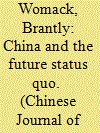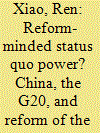| Srl | Item |
| 1 |
ID:
139156


|
|
|
|
|
| Summary/Abstract |
Although China’s underlying capabilities have developed at a fairly steady pace over the past 20 years and its ambitions have remained relatively stable, the shock of uncertainty and relative change since 2008 has driven an ongoing interaction between heightened international anxiety over China’s rise and greater assertiveness on China’s part. In academic circles, the question is raised whether China is a status quo power willing to be a stakeholder in the existing international system, or whether it has ambitions to be a revisionist power challenging the existing order. The resulting tension is especially acute in East Asia and in relations between China and the United States. Given the novel dynamics of the current era of global economic uncertainty, international normalcy should not be judged by the status quo of the post-Cold War era but rather by a ‘status ad quem’, a future situation of sustainable relationships in a post-hegemonic era. The prospective diplomacy of all states should be judged by the likelihood of their accommodation to a new era.
|
|
|
|
|
|
|
|
|
|
|
|
|
|
|
|
| 2 |
ID:
152273


|
|
|
|
|
| Summary/Abstract |
Chinese President Xi Jinping has advocated a new model of international relations where all countries engage in mutually beneficial cooperation and work together to address common challenges. In his view, the model is in line with the incontrovertible world trend, and reflects the aspirations of countries and people for peace, development and prosperity. In short, all should strive to build a “community of common destiny”.
|
|
|
|
|
|
|
|
|
|
|
|
|
|
|
|
| 3 |
ID:
143553


|
|
|
|
|
| Summary/Abstract |
This paper analyses the case of China in the G20 process and examines China’s position and policies on relevant issues, including international monetary system reform, reform of the international financial institutions (IFIs), international financial regulation, the future of the dollar, and internationalisation of the renminbi. My findings demonstrate that China has actively participated in the G20’s deliberations and actions, put forward its suggestions, sought an expanded share and voting power in the IFIs in correspondence with its rising status, and promoted the internationalisation of the renminbi. It does not aspire to overthrow this system within which it has prospered. In this sense China is a status quo power. Meanwhile China argues that the current international order is flawed and that there exist a number of unjust and unreasonable components. They have long needed to be changed. My conclusion is that China is not a complete but rather a reform-minded status quo power.
|
|
|
|
|
|
|
|
|
|
|
|
|
|
|
|